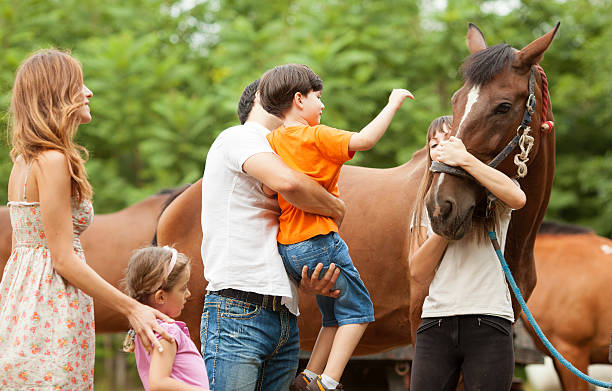Horses aren’t just animals who live in a field; they’re beloved family members who bring joy, companionship, and unique challenges. The right care and attention are crucial to ensuring your horse’s health, happiness, and well-being. This guide provides some essential tips for looking after your horse as part of the family, including a section on safely moving your horse to a new location.
Daily Care and Routine
- Feeding: A balanced diet is essential for your horse’s health. Horses need a diet that’s rich in forage, such as hay or grass, supplemented with grains and specialized feed as needed. Ensure your house has constant access to clean, fresh water.
- Grooming: Regular grooming helps to maintain your horse’s coat, skin, and hoof health. Brush your horse daily to remove dirt, loose hair, and debris. Check for signs of skin conditions or parasites. Clean your horse’s hooves daily to prevent infections and monitor for any abnormalities.
- Exercise: Horses of all sizes require regular exercise to maintain their physical and mental health. Provide daily turnout time in a safe, spacious paddock. Engage in regular riding, lunging, or groundwork sessions that are tailored to your horse’s fitness level and age.
- Veterinary Care: Routine veterinary care is crucial. Schedule regular checkups, vaccinations, and dental care. Keep an eye out for any signs of illness or injury, and consult your vet promptly if you notice anything unusual.
- Social Life: Horses are social animals that thrive on interaction with other horses and humans. Provide opportunities for your horse to bond with other horses. Spend quality time together with your horse, building a bond through grooming, training, and simply being together.
Creating a Comfortable Environment
- Shelter: Ensure your horse has access to adequate shelter, including a stable or run-in shed, to protect against extreme weather conditions. The shelter should be clean, dry, and well ventilated.
- Bedding: Provide appropriate bedding, such as straw, shavings, or rubber mats, to create a comfortable resting area. Regularly clean and replace bedding to maintain hygiene.
- Safe Turnout Areas: Designate safe, spacious turnout areas for your horse to graze and exercise. Regularly inspect fencing and gates to ensure they’re secure and free from hazards.
- Enrichment: Keep your horse mentally stimulated with enrichment activities. Offer toys, obstacles, and varied routines to prevent boredom and promote mental well-being.
Moving Your Horse to a New Location
Moving a horse to a new location can be stressful for both you and your horse. Careful planning is essential to ensure a smooth transition.
1. Choosing a Transport Method
- Horse Trailer: For short to medium distances, a horse trailer is a common and convenient option. Ensure the trailer is well ventilated, spacious, and equipped with appropriate safety features.
- Professional Transport Service: For long distances or international moves, consider hiring a professional horses transportation service. Choose a reputable company with experience in equine transport and positive reviews.
2. Travel Safety
- Loading: Load your horse calmly and safely, using gentle encouragement. Ensure they’re securely tied and that all doors and partitions are closed properly.
- During Travel: Monitor your horse regularly during the journey. Ensure adequate ventilation and maintain a comfortable temperature inside the trailer. Provide water and, if possible, some hay to keep your horse occupied.
Building a Bond and Ensuring Well-Being
- Trust and Respect: Building a strong and loving bond with your horse is essential for a harmonious relationship. Spend quality time together, and approach training with patience and consistency. Show respect for your horse’s boundaries and communicate clearly through body language and cues.
- Training and Learning: Regular training sessions help to keep your horse mentally engaged and well-behaved. Use positive reinforcement to encourage desired behaviors. Continuously learn and adapt your training methods to suit your horse’s temperament and abilities.
- Monitoring Health: Keep a close eye on your horse’s health and behavior. Regularly check for signs of discomfort, lameness, or changes in eating and drinking habits. Early detection of health issues can prevent more serious problems further down the line.
To Conclude
Caring for your horse as part of the family involves dedication, knowledge, and a deep bond. By providing proper daily care, creating a comfortable environment, and carefully planning any necessary moves, you can ensure your horse’s health, happiness, and well-being. Treat your horse with the love and respect they deserve, and you’ll enjoy a fulfilling and enriching relationship with your equine companion.

